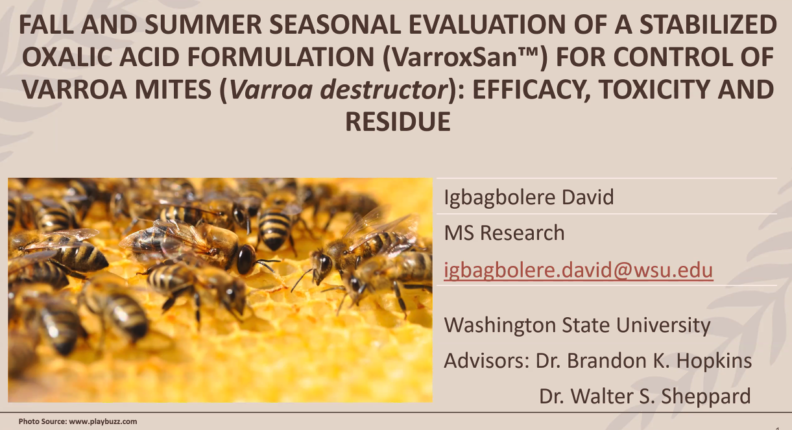Making a Buzz on the Palouse and Beyond – Celebrating our Major Donors
Many thanks to our wonderful donors who all came together (in person and virtually) on March 15th! It was a positive and productive meeting with faculty and staff at the WSU Honey Bee + Pollinators Facility in Othello. Donors were able to fill their jars with WSU Bee honey and listen to the team give several presentations that highlighted the progress being made in research and extension in our bee program. We appreciate the continued support from these major donors and could not be able to conduct the research that we do, without them.



Now available: Online Form to Request a Speaker from WSU Bee Program
Our extension coordinator, Bri Price, has visited many regional beekeeper associations in Washington over the last few months. One of the most frequent requests of the WSU Bee Program is more presentations about current research from members of the bee team. To make this possible, we’ve streamlined a way to connect with us about potential opportunities to visit your association or attend an event and present about our program’s research.
Please use this link below to read about who is available for a presentation and what topics they are happy to cover. Then, fill out the form at the bottom of the page to request a speaker. We will do our best to coordinate and fulfill these requests.
Future Farmers of America (FFA)
In a recent WSU Bee Program tour, Dr. Brandon Hopkins, Molly Quade, Riley Reed, and Jen Eason taught the FFA group from Pullman High School about honey bee management including anatomy, pest management, feeding needs, and traits of different honey bee subspecies such as Italian and Carniolan bees. The group’s main objective for this visit was to learn more about honey bees and be able to start selling beekeeping equipment to the public.

Sandhill Crane Festival 2024 in Othello

Congratulations and Farewell
Igbagbolere “Lere” Adeoluwa recently graduated with his Master of Science in Entomology this Spring. Lere spent several years investigating the effectiveness of a new stabilized oxalic acid option for Varroa management, VarroxSan. He found that VarroxSan effectively controls mite levels, is non-toxic to honey bees, and leaves minimal residues in honey. This option is an especially exciting addition to beekeepers’ IPM tool box since VarroxSan can be used while honey supers are on, and application is not temperature dependent like other miticide options. Congratulations to you, you will be missed!



